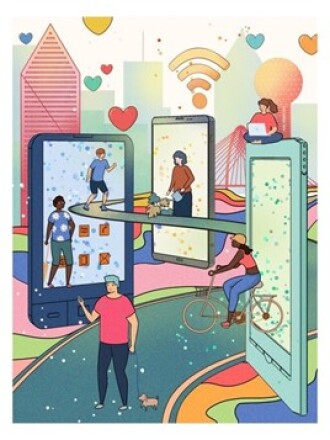- Art Brings Awareness in Dallas
- States Awarded Federal Funding
- St. Louis Installs Wi-Fi in Parks
- Election Results in County Wi-Fi Expansion
- Yolo County Offers Spanish Digital Literacy Classes
ART BRINGS AWARENESS IN DALLAS
The city of Dallas, Texas, held an art contest, “Innovate and Create: Digital Art Challenge,” announced in September to bring awareness and engagement to the topic of digital equity. The city unveiled the three contest winners in late October.
Winners, Nguyen Tran, Hai Tran and Joey Myers — in first, second and third place, respectively — will have their digital artwork publicly displayed at the J. Erik Jonsson Central Library.
The art contest was part of the city’s Digital Inclusion Week 2024 celebration, the theme of which was “Stronger Together: Mobilizing Toward Sustainability.” Digital Inclusion Week is a nationwide week of awareness and celebration of the digital inclusion work taking place across the country; this year saw 194 events in 27 states. The National Digital Inclusion Alliance powers this initiative, which was held Oct. 7-11.

Artwork created by Nguyen Tran
“The help you need might just be one mouse-click away,” Nguyen Tran said in a statement. He underlined the important role technology played in his community during the 2021 Texas snowstorm. At this time, people were cut off from resources, and the community found out about it online and offered support.
The unique effort is an example of the role storytelling plays in digital inclusion work, a trend that appears to be growing as seen by a recently launched program in Cook County, Ill.
“This challenge is an excellent opportunity to spotlight the importance of digital equity and showcase how technology can enhance the creative process,” the contest announcement said.
The contest is one piece of the city’s broader digital equity efforts, more information on which can be found on the city’s website.
STATES AWARDED FEDERAL FUNDING
The National Telecommunications and Information Administration (NTIA) has begun approving states’ applications for Digital Equity Capacity Grant Program funding. The newly announced awards include $36 million for New York, $13 million for Alabama, $7 million for Utah, $13 million for Wisconsin and $9 million for West Virginia.
The awards made thus far include $70 million for California, $9 million for Connecticut, $22 million for Georgia, $14 million for Indiana, $12 million for Minnesota and $8 million for New Mexico.
The initiative is one of three grant programs established through the Digital Equity Act. NTIA will continue announcing awards from this first round of state Digital Equity Capacity Grant Program funding on a rolling basis.
ST. LOUIS INSTALLS WI-FI IN PARKS
The city of St. Louis, Mo., in partnership with the St. Louis Development Corporation, began installing free Wi-Fi in nine city parks last week. This project is made possible through American Rescue Plan Act (ARPA) funding. The city is also using ARPA funding to create digital literacy programs.
“Community Wi-Fi leverages city assets to increase Internet access for our residents closer to where they live,” Simon Huang, St. Louis chief technology officer, said in a statement.
In addition to the nine city parks, free Wi-Fi will also be available on the Dr. Martin Luther King Jr. Drive corridor between Kienlen Avenue and Grand Boulevard; work will begin there in January 2025.
ELECTION RESULTS IN COUNTY WI-FI EXPANSION
More than three-quarters of voters in Miami-Dade County, Fla. — 76.72 percent, to be precise — voted to support the expansion of free, public Wi-Fi access, according to an announcement from county Commissioner Kionne McGhee. This is a non-binding initiative that demonstrates the widespread support for this effort.
“Expanding free public Wi-Fi would help close the gap for marginalized communities and create opportunities for economic mobility and generational wealth,” McGhee said in a statement.
The goal is to bridge the digital divide in the county, where about 25 percent of the county’s students currently lack high-speed Internet access at home. The initiative would aim to support school students, rural communities and senior citizens.
YOLO COUNTY OFFERS SPANISH DIGITAL LITERACY CLASSES
Last month, Yolo County, Calif., announced it would continue offering free digital literacy classes in Spanish. Government services and programs that do not include multilingual access often leave populations out, and this program aims to fill that gap.
The Northstar Digital Literacy classes are open to all Spanish speakers and require no cost to participate. They will be held Nov. 6 to Dec. 4, and from Jan. 8 to Feb. 12. No prior computer experience is required; the classes will cover basic computer operation and software skills, and everyday activities.
The courses are offered through a partnership between YoloWorks!, the Yolo County Workforce Innovation Board, and the Yolo County Health and Human Services Agency. This program's initial success last year led to its continuation.









